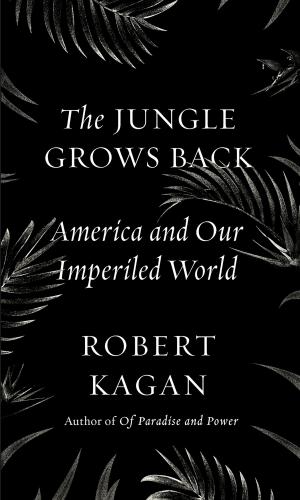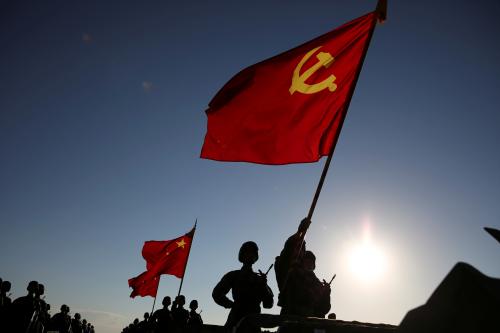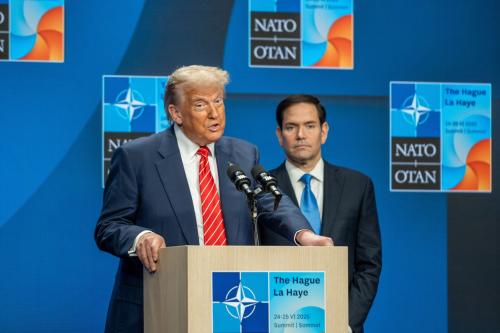Looked upon as one of our government’s greatest achievements, the European Recovery Plan post-World War II, which became the Marshall Plan, was central to the recovery of Europe and helped to rebuild the war-torn European continent and construct a stable foundation on which future allies could grow economically and structurally. Far from being a singular effort to stave off famine and chaos, the plan—and the billions in aid that accompanied it—“was the centerpiece of Harry Truman’s effort to contain communism abroad,” as Paul Light wrote in 2002. The events of World War II, combined with the after-effects and execution of the Marshall Plan, launched the United States into the role of single superpower. Democratic governance established under, among other things, the leadership of the U.S. military during reconstruction provided security, as well as a platform for the resulting social and economic development of Germany and Japan in particular.
To maintain this position in a new era of great power competition today, the United States needs to continue to invest in the world and commit to the growth of security and stability abroad. Currently, overseas military and economic engagement occur sporadically and somewhat independently. Instead, what is needed is a written, integrated military, economic, and social campaign plan to mitigate terrorism, migrant flows, and other non-state threats to security and prosperity around the world. Such an effort would, in fact, be connected to great power dynamics: It can be a means to exercise national power to counter Chinese development and military investments by taking a long-term approach to nation-building and fostering stable future partners, just as the Marshall Plan once did vis-à-vis the Soviet Union. Specifically, this kind of effort should be undertaken toward Africa and Latin America, to shore up areas that are in the strategic backyards of the United States and its allies in Europe.
The benefits of military diplomacy
Foundational to this plan would be a strong commitment to economic investment in the future of disparate regions—but especially Latin America and Africa given their direct relevance to American security—the use of NATO-like organizations by the region, and employment of our military to enhance partnerships within those regions.
Within the main elements of national power (diplomacy, informational, military, and economic, or DIME), the military is often considered the last resort. However, the U.S. military has been a key player in, for instance, the spread of democracy, building partner countries’ strength through military-to-military relationships (including in the form of bi- and trilateral exercises to support standing Operation Plans, NATO, the United Nations, and Theater Security Cooperation), personnel exchange, and humanitarian assistance operations. Through these efforts, among others, the U.S. military helps to carry out the diplomatic mission of the United States (military diplomacy paved the way for NATO, the European Union, and the World Trade Organization, for instance). When military units participate in bilateral or multilateral exercises with other countries, for example, the purpose is several-fold: The interaction increases interoperability between the militaries, provides for cultural exchange and understanding, and offers an opportunity to expand each nation’s capabilities while exercising potential contingencies. The importance of military diplomacy in foreign engagement is to build dialogue that may facilitate further communication and, during a crisis, avoid confusion between cultures.
Moreover, in places where the U.S. military has maintained a long-term presence (e.g. Japan, South Korea, Germany), we see that military interoperability enhances regions economically—directly through commercial contracting and the resulting employment, servicemember contributions through commerce, and in some cases, contributions of military gear and equipment through foreign military sales or otherwise.
The resulting “military diplomacy,” also referred to as “defense diplomacy,” “soft power,” “military public diplomacy,” and “strategic communication,” allows the military to have a direct impact on foreign policy through other means. Although not diplomacy in the traditional sense of a State Department mission, military relationships between countries build a foundation on which further connections between nations are developed.
The China factor
This type of diplomacy is not exclusive to the United States, however. As the China Power Team at the Center for Strategic and International Studies has written, China’s President Xi Jinping has “stressed that military diplomacy is a critical element of how China engages with other countries,” and has steadily increased military exercises and exchanges, port calls, and humanitarian operations. As now the world’s second-largest economy, China has the resources to increase military diplomacy abroad. Its long-term Belt and Road Initiative, importantly, is often integrated with China’s own military diplomacy. Although nascent, China’s military diplomacy role has been described by one Chinese scholar as “the pursuit of foreign policy objectives under the guidance of China’s national grand strategy through the peaceful employment of military resources and capabilities to maintain national interests (both domestically and overseas), security, and development.” If China is integrating military diplomacy into its grand strategy, so too should the United States in this new era of strategic competition. Otherwise, Washington risks falling behind.
Additional applications
In addition to sustaining U.S. influence abroad in the face of an increasingly global Chinese military, another benefit to military diplomacy and development assistance in unstable areas is the ability to help curb migrant flows. Migrant routes into, primarily, Europe from Africa and into North America from Latin America are sustained by a lack of security, political stability, and economic opportunity in vast portions of the developing world, and this increasingly poses a staggering cost and security risk to European countries, the United States, and our other allies.
In order to counter this, the United States should have a coordinated, long-term approach to development. It should particularly do so where critical infrastructure and investment may help build and maintain current and future partners in Africa and Latin America, some of which are targets for Chinese economic investment or military cooperation. Countries in Latin America and Africa are essential to U.S. and European security. Unless the United States provides a degree of presence, military partnership, and long-term dedication to economic development, regional countries have few options for assistance—making China a convenient and default partner.
A long-term plan for shoring up American security
Since military people know better than anyone the true cost of waging war, the U.S. military has a vested interest in working to build capabilities and partnerships to maintain worldwide peace and stability. Although the lines between what are doctrinally military or diplomatic missions may blur, it is to the advantage of both the State Department and the military to capitalize on any opportunity to advance the policy and security of the United States. The military, known as a hard-power tool, can also be used as a soft-power one. Military members serving overseas in any capacity are already often the forefront of American diplomacy, moving their mission set beyond traditional warfighting to an extended role in support of the National Security Strategy of the United States, with great success.
The fact that China is increasingly involved in regions like Africa and Latin America—giving Beijing influence there—is further reason for the United States to take a more active approach and mitigate vulnerabilities. China has learned from our greatest strategic achievement, the Marshall Plan, and has formulated a long-term strategy to, among other things, undermine U.S. influence. We need a coordinated, long-term plan of military diplomacy and economic support in response.
The Brookings Institution is committed to quality, independence, and impact.
We are supported by a diverse array of funders. In line with our values and policies, each Brookings publication represents the sole views of its author(s).






Commentary
The use of military diplomacy in great power competition
Lessons learned from the Marshall Plan
February 12, 2019